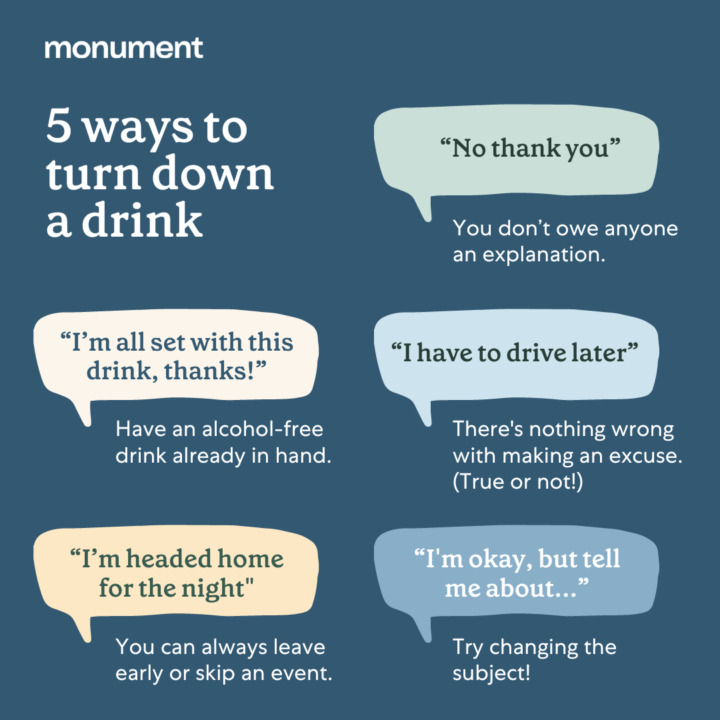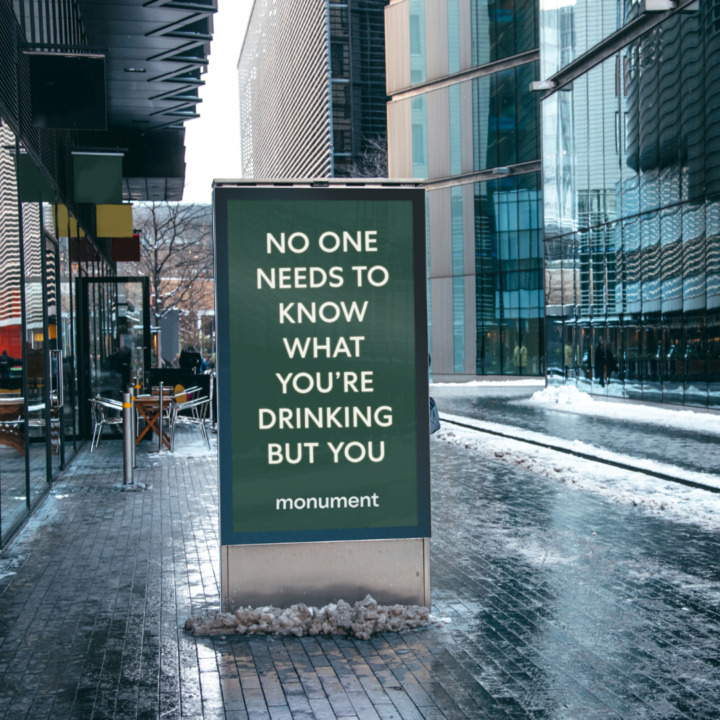Your choice to drink less or not drink at all is something to be incredibly proud of. It’s a choice that represents self-care, mindfulness, boundary setting, and so much more. While many recognize that drinking less is a superpower, alcohol still shows up in our culture in a big way. It can be difficult to avoid drinking alcohol, whether that’s at family gatherings or within your social circle. It can also be challenging to say ‘no’ to alcohol in a social setting. There is no shame in that. However, you can say no, and we’re here to guide you along the way.
Wherever you are on your journey, here are some practical tips on how to prepare for saying no to alcohol, and suggestions on what to actually say when it’s offered.
How to Prepare To Stay Sober at Social Events
If you’re nervous about staying sober at an event where alcohol is present, that’s very normal. The good thing is, there are ways you can prepare in advance to make it easier for you to navigate these environments without drinking. Just the act of preparing, however you choose to do so, can give you a greater sense of control over the situation.
Share your goals with the people you trust
A large social situation can be an intimidating time to share your sobriety or moderation goals. Instead, start small. See if you can identify one or two people you would feel comfortable talking to about your boundaries. An informed support system can help you stay accountable and steer conversations and activities away from alcohol. Honestly sharing with others in a safe environment can be incredibly empowering. Haven’t told a close friend yet? Here are a therapist’s tips for how to tell someone you’re getting treatment to change your drinking.
Work with a therapist specialized in online alcohol treatment
Engaging in online alcohol therapy can be incredibly beneficial for many reasons. A specialized therapist can help you define your goals and build the confidence and coping mechanisms to achieve them. Your therapist will also help you identify your support network, make a plan for potentially triggering situations, and even role-play challenging conversations. Sharing your choice not to drink with your friends, family, and colleagues can be difficult to navigate alone. Your therapist will act as a consistent resource to guide you at every turn.
Practice your answers ahead of time
If you feel nervous about how you’re going to say no to alcohol at an event, there’s nothing wrong with practicing beforehand! (In fact, it’s a great idea.) While it may feel strange at first, rehearsing your answer out loud can help you decrease anticipatory anxiety and feel more prepared to give a confident answer when the moment arises. That said, how much you want to share is completely up to you. You don’t owe anyone an explanation.
Now that we’ve identified a few ways to plan ahead, here are 6 strategies you can put into practice at events and gatherings.

6 Ways To Say No to Alcohol
There are many ways to turn down alcohol at an event. If you’re not comfortable sharing your sobriety yet, there are other verbal and physical strategies you can use to set boundaries. You should feel empowered to use whatever tools feel most natural to you at the moment. Preparing multiple options ahead of time can help you feel more comfortable and confident when saying no to alcohol.
1. Give a simple, firm answer
Remember that you are in control of your choice to drink. You don’t need to apologize, provide a reason, or aim to make anyone more comfortable with your decision. If you receive any comments or questions, be firm in your refusal and remember that you don’t owe anyone more than a simple “No thank you, I’m all set”. Most people will accept your answer at face value. If they don’t respect your boundaries, it’s important to remember that it’s likely a reflection of their own relationship with drinking alcohol, not your personal choice.
2. Have a non-alcoholic beverage in hand
There are so many exciting alcohol alternatives available now, so you don’t have to miss out on having a festive and delicious drink at the event. Sipping on a non-alcoholic beverage can also make it easier to navigate an event where there’s alcohol consumption. If you’re offered a drink, you can politely respond, “I’m happy with what I’m already having, thank you” or “No thank you, I’ve already got one.” Check out Monument’s alcohol-free drink book, Delish AF, for some inspiration! If you’re not ready to build new rituals with non-alcoholic beverages, that’s totally understandable. There are many other strategies to put into play.
3. Change the subject
There are so many better topics for discussion than whether or not you’re having a drink. When asked if you want a drink, give a quick answer and then bring attention back to a more compelling conversation topic. For example: “No thank you, but I do need to hear all about your recent trip!” Not only is this a great way to move on from the topic of alcohol, but it also facilitates more meaningful conversations and connections. And remember this: Everyone is the star of their own movie. No one is thinking about you as much as you are, so it’s likely someone will be thrilled to share more about themselves.
4. Use physical cues
Often we can turn down a drink offer without even needing to use words. If you’re in a dining setting, you can simply remove your wine glass from the table, shake your head at the waiter, or cover your glass with your hand. If you are at a bar, you can opt to sit at a table farther from where alcohol is being served. These cues are well-understood in the service industry and can make it easier to avoid being asked repeatedly if you want a drink.

5. Make an excuse
If you feel panicked or out of options, you can simply make an excuse. While it might feel dishonest, your sobriety or moderation goals are more important. There are many reasons why people don’t drink, like being on medication, needing to drive home, or having to wake up early in the morning. There’s nothing wrong with saying, “I’m not drinking tonight, I have to drive later.” If making an excuse feels like the best way to say no in the moment, you should feel empowered to do so. Your wellness comes first, no matter what.
6. Skip the event or leave early
If you believe a social situation will be especially difficult for you to be in without drinking, you do not have to go. Especially in early sobriety, it can be difficult to attend events and visit venues that you closely associate with drinking. It’s more than okay to not go or to leave whenever you feel ready. You can say, “I’m headed home for the night, thank you for having me”, and there’s no need for any other reason. You are making an amazing lifestyle change for yourself, and you deserve time and space to adjust.
Should You Avoid Social Events in Early Recovery?
Ultimately, whether or not to avoid events in early recovery is a personal decision. Many people find that they benefit from avoiding people, places, and things that remind them of drinking. It’s reasonable to give yourself space from potential triggers while you’re gaining confidence in your sobriety and working on other aspects of recovery, like building alternative coping mechanisms. Even if you skip out on the alcohol-centric events, you can still socialize while sober! You can check out local sober events in your area, opt for socializing through fun alcohol-free activities, or host your own alcohol-free event. Some people still attend alcohol-centric events in early sobriety, while others avoid them entirely. Everyone is different, and with time and experimentation, you’ll get a sense of what social events you feel comfortable attending. Plus, you can always add certain activities back in down the road.
It can be difficult to say no to alcohol consumption in the heat of the moment, especially when experiencing peer pressure. Whenever these moments arise, ground yourself in your “why”: the reasons you are choosing not to drink. This will keep you connected to your goal and empower you to make choices that align with your ideal self. You also have a supportive community here at Monument and can check in for encouragement in a support group or in the 24/7 forum. Everyone is different and we each have our own communication styles. However you feel comfortable saying no, that is 100% valid. Just remember, this decision is yours, and it’s something to be incredibly proud of.
